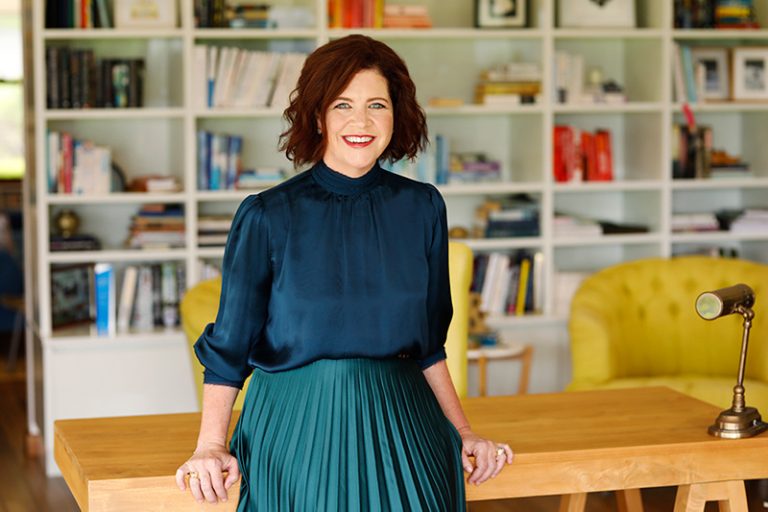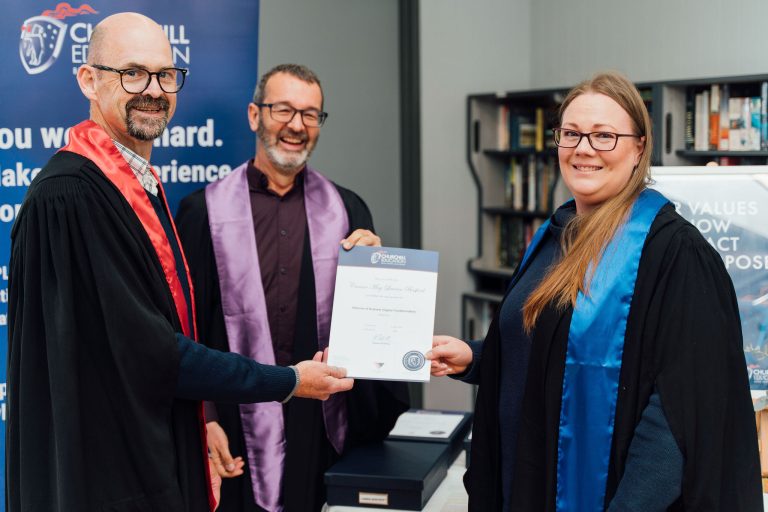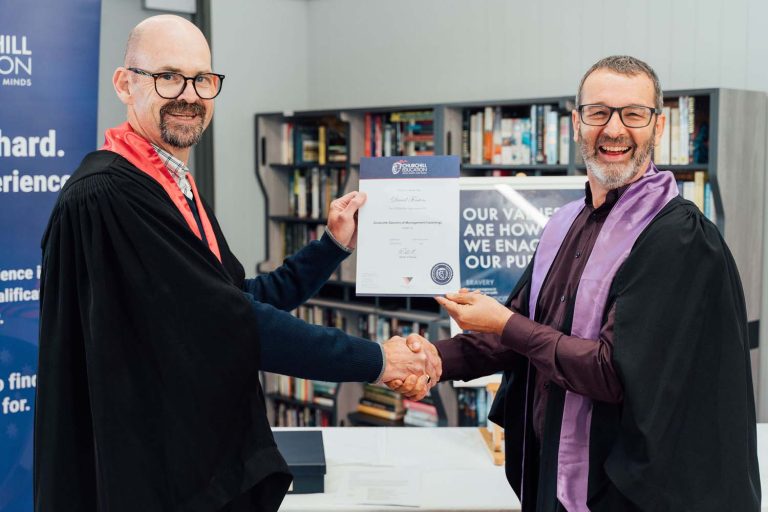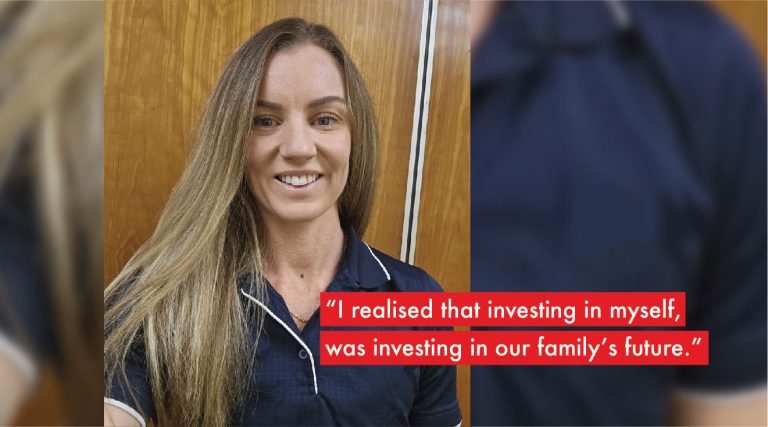Budgeting is not generally considered to be sexy. But making your money work for you with the help of effective budgeting, particularly with the cost of living on the rise, just got a lot sexier! Here are some tips and tricks from a few of us here at Churchill Education. Make sure you read all the way to the end so you don’t miss out on your chance at our priceless book giveaway…

Listen to this story on our podcast…
When we were kids, there was a little delicatessen at Sue’s Corner, Boondall in northern Brisbane. It had sliced meats in the cabinet, shelves of international canned foods, Dutch biscuits and cheeses. But none of that really captured my attention like what sat on top of the serving counter: jars and jars of lollies.
My sister loved the caramel cobbers, Dad would order the Dutch liquorice, and I just loved it all. I loved the fact that each lolly was priced in cents. And every once in a while, we got to order some lollies in those little white paper bags.
That was when budgeting first entered my world. Determining how to spend the rare silver coin that made its way into our hands by ordering a mix of lollies was the ultimate balance of desire and constraint. That coin never felt like it went far enough.
And for many years, that is exactly how budgeting seemed to me – an endless cycle of never having enough.
In 2022, a constant focus of the news cycle has been the rising cost of living. The $5 worth of fuel that I could rely on as a young driver to get me around is a momentary blink these days as I fill up my car.
It makes sense that you have to make money to spend money. We regularly talk with our Alumni and community about how to improve your earning prospects, and we recognise three key features:
- Get qualified – Australian research shows that people who hold qualifications out-earn people who don’t get qualified, so keeping up to date with your qualifications at the highest possible level is important.
- Stay qualified – we also know that it is important to stay abreast of changes in qualifications so that as gaps arise in the market and employer’s expectations change and industry benchmarks move, you are never caught behind and remain competitive.
- Stay connected – job opportunities are often shared within networks, so it is important to build up good professional networks.
Find out what you’re eligible for
With the best grounding to earn good money underfoot, it is then a question of how best to manage the money you do have. In this current economic climate, whilst the Churchill team has been talking about making the dollar stretch further, we have also been comparing budget approaches.
It turns out that most of the Churchill team work to a budget and when asked were very willing to share what has worked for them with you.
Let’s walk through the Best Budgeting Bang for Buck principles they shared …
1. Set a Financial Goal
When I first started my legal career, I had never known so much money existed. I was earning $45,000 per year + superannuation. The income was coming my way and I thought no more beyond that.
When I met Randall, I had a good collection of shoes, a car loan and a big credit card debt. On the other hand, Randall had his own house, a car he owned outright, an annual ski holiday he paid for in cash, and money in the bank.
The difference between us was simple: he had financial goals. I just had a paycheck.
The reality is that good money management always means keeping some money aside, not spending every cent you earn (and in some cases, more money than we have earned). It is easier to save money when you have a clear reason why you are saving that money. That is why it is valuable to have a financial goal.
When Churchill’s Trainer/Assessor, Melody McNulty and her husband Jeff, bought their home they had a financial goal to own their home outright by their 40s. Mel then worked out exactly what they needed to do to achieve this and budgeted accordingly. Mel and Jeff were able to collect the deeds for their property in Mel’s late 30s.
As Mel said, “This came about through knowing exactly what I wanted to achieve and strategising how to get there.”
Meanwhile, Trent Young, one of Churchill’s RPL Assessors, has a goal with his partner Steph: to buy their first home. Getting a solid deposit is peace of mind in the making and so with that goal in mind, Trent and Steph are saving 30% of their income towards the house deposit. Yes, it means some sacrifice, but the reward is so worth it!
And on the flip side, Mel was kind enough to share with us a goal she hasn’t achieved because she never put together that plan.
“I was also going to retire at 55, however I never established exactly how much I would need or strategised how I would get there, hence I am now nearly 60 and still working. Lucky, I love what I do!!!”
2. Failing to Plan is Planning to Fail
This is one of Mel’s money mantras. Over the years, Mel has helped many Churchill colleagues get their finances sorted and as she always reminds us, if you don’t have a plan for your money, it will move straight into someone else’s bank account.
Yes, money moves around like that … dollars are slippery little suckers, especially in this age of tap and spend.
Sitting down to look at what you are spending money on can be confronting but is vital to taking control of your finances.
There was a time when I had cranked up the credit card debt and I had to face the music. Ignoring it only made matters worse! I had to look myself in the financial mirror and work out what had to change.
Over COVID lockdowns, Australians spent less than ever, and credit card debt fell to its lowest in 18 years. Mortgages got more money stashed away and for one reason: staying home led to less spending opportunities. Life was simpler financially. We were also more mindful of keeping some money aside because we were uncertain about our job security.
Starting with any money management approach must begin with some honesty: what is coming in and what is going out in expenditure?
Appearances can be deceiving. Those with big dollar incomes can equally have the biggest debts whilst looking like they are flying high.
That flash car could just as easily be a metal box of IOUs and the sedate family car could be a beast of financial freedom.
It is important to lift the lid on your spending so you can come up with a plan that addresses all your financial responsibilities.
3. Find an Everyday Financial Approach that Works for You
For a long time, I avoided budgeting because I tried to budget every single item that Randall and I could possibly have to spend in the month and year. It caused me to stress so much that I abandoned the plan altogether.
It was only when I read The Barefoot Investor by Australian financial expert, Scott Pape, that I realised it was not the principle of budgeting that was the problem – it was the method that I was trying to use. I needed an everyday financial approach that worked for me.
This is what Randall and I came up with that worked for us:
- 60% of our income goes into a Daily Expenses account – this includes money towards our mortgage and regular bills. This account has a card that can be used out and about.
- 20% of our income goes into a Fire Extinguisher account – this is peace of mind money in saving for the future or for something major that comes without warning. This account cannot be accessed directly with a card.
- 20% of our income goes into a Smile account – this is money for holidays, gifts, eating out and home projects that make us happy. This account has a card that means it can be directly accessed.
By breaking down our budget into percentages, I found it less overwhelming. I could look at upcoming bills and plan for these without feeling the itemised pressure every week.
That worked for me, but for Carina Bancroft, Churchill’s Office Manager, she enjoyed the transparency of the itemised budget and came up with a different approach.
“Ever since I moved out of home, I’ve had two accounts (or more) – it’s very similar to what the Barefoot Investor suggests.
The first is used for everyday spending and the other for all my direct debits/bill payments. To figure out what needs to go into my “bills” account each pay cycle, I’ve set up a table/spreadsheet of all my possible expenses for the year and then broken each down into the frequency of my pay cycle – get your pay split by payroll and you don’t even have to think about it.
A third account I’ve had for a while is that I also like to budget for birthdays, Christmas, Mothers’ Day and Fathers’ Day, setting a budget for each person’s celebration and again working it out into a pay cycle figure.
I find doing things this way, you really know how much play money you have each week, fortnight and month to comfortably spend, don’t get overwhelmed when those bigger bills come in like rego or at Christmas (for those of us who don’t buy through the year) and you don’t get sprung at the checkout because a direct debit came out that you forgot about!”
Unlike Carina, when Churchill’s Marketing and Communications Manager Leonie, first moved out of home she spent too much money on CDs, beer and cigarettes, feel into college rental arrears and almost got kicked out of uni!
Fortunately since then she has learned a thing or two about adulting and also splits her income into multiple budgeting accounts…
“I have an account for everyday expenses like mortgage payments, food, fuel and utilities, and separate accounts for savings, school fees, travel and fun. I’ve got them all set up as offset accounts so that instead of paying tax on paltry interest accrued, I save a lot more on interest owed on my home loan. Next I’m thinking about salary sacrificing into super to save some tax now and build towards the leisure years!”
4. Sneaky Savings
With the main budget under control, it seems we all get a little kick out of sneaky savings. That’s the way you find extra dollars to make work for you.
For me, I realised that Facebook Marketplace was a great way to bring in some extra cash by selling odds and ends that I was no longer using. That cash goes into a jar under the kitchen sink and is available for a rainy day.
Randall sweeps any tax returns we may get into a little account (again with no card attached to it) he dubbed Nest Egg.
John Brayshaw, one of Churchill’s Skills Recognition Specialists, shared a clever little trick he and his wife Debbie have used for many years to get ahead.
“We started to operate a ledger when we first got together in ’95 and times were tough. We still use this method, and it has served us well. We enter both credits and debits, which, you can easily see with online banking nowadays, but we have a little trick that always ensures there is a bit in the bank for a rainy day…
For everything we spend, we round up….so $23.60 goes into the ledger as $25. Everything that comes in, we round down, so $23.60 is entered as $20. This simple example will give you +$4 of profit……every little helps when you’re on a budget!! In reality, we all have a lot more expenditure than gain, so it adds up fast.”
It was only after John shared this approach that I realised ING (the bank that Randall and I use) offered a similar idea. It is called Everyday Round Up. Every eligible card purchase we make with our Daily Expenses card is rounded up to the nearest $1 or $5 (you decide which) and the extra amount is shifted from our Daily Expenses Account to our Smile Account. I set it up that same day and it is making me smile because even cents add up.
Carina also added her Sneaky Savings trick to the mix:
“Move what’s left in your “spending” account the day before/morning of your pay and throw that into your saving account if you have one and start off the pay cycle with a clean slate of spending money.”
Next month, I am going to start doing that too!
As we head towards the end of financial year, it is a good time to reflect on where we all sit financially. You may want to earn more in the next financial year and getting some clarity around your career could be the turning point in reaching that next goal. We’re always here to help you talk through your options.
To discuss your career goals, and find out what qualifications you may be eligible for through a complementary preliminary Recognition of Prior Learning assessment, call us on 1300 793 002, email us at hello@churchilleducation.edu.au or submit your details here and we will be in touch within two business days.
Book Giveaway!
You may want a simpler life financially, and the idea of reading The Barefoot Investor makes sense to you.
We have five copies to give away! – To enter, send us an email and tell us about a financial goal you have and we’ll throw your name in the hat. Or you can head down to your local Big W and pick up a copy for yourself for $19.
If you are in over your financial head, then reach out for help – call 1800 007 007 and speak to a not-for-profit financial counsellor today. Trust me, seeking help today is better than going it alone tomorrow.
Take care,
Tricia Velthuizen









